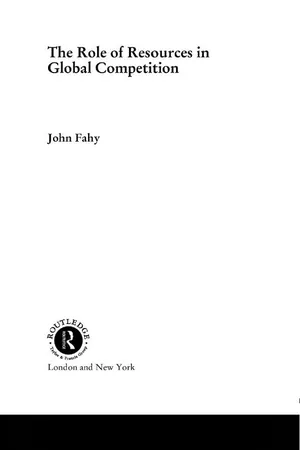Business
Business Considerations from Globalisation
Globalization in business involves the expansion of operations across international borders. Key considerations include understanding diverse cultures, adapting to different legal and regulatory frameworks, and managing currency exchange rates. Businesses must also navigate global competition, supply chain complexities, and geopolitical risks. Embracing technology and innovation, building strong partnerships, and maintaining flexibility are crucial for success in a globalized business environment.
Written by Perlego with AI-assistance
Related key terms
1 of 5
3 Key excerpts on "Business Considerations from Globalisation"
- eBook - PDF
- Abhishek Singh(Author)
- 2019(Publication Date)
- Society Publishing(Publisher)
They will also be able to ensure tie ups with key partners and distributers. The consumer demands are expected to continue to grow and the world Global Prospective on Business 3 economy will continue to flatten. This will give rise to the expectation that the business will be able to serve many markets. A slow adopter in the fast paced world would eventually be wiped out from the market. Globalization is only one factor, which has contributed to the success of multinational business. Communication technology has also played an important role. Advancement in technology allows fast and cost effective communication. This enables businesses to access global markets easily. Though operating on a global scale is advantageous for businesses, it also has its downside. This includes cultural differences, financial problems, legal barriers, etc. A business has to adhere to the laws and regulations of the host country, understand consumer preferences, and adopt their business practices. Management of business on a global scale is both rewarding and challenging. The competition amongst businesses is increasing along with the complexities of operations. Businesses are striving to formulate strategies for better management of their global assets. Various factors have been identified which can contribute to the success of the business by making production cost efficient, increasing consumer response and generating revenue for the company. 1.2. GLOBALIZATION Globalization is not a recent phenomenon, just that its impact has been feel more strongly in the recent years. Towards the end of cold war, the macro-economic impact of globalization became more visible. Its effects have continued to advance rapidly with the advancement of emerging markets, improvement in technology, establishment of free trade agreement, the growing global footprint of business and the increased liquidity of sophisticated capital markets. The globalization has led to worldwide macroeconomic maturation. - eBook - ePub
- John Fahy(Author)
- 2002(Publication Date)
- Routledge(Publisher)
Strategic decisions, it was felt, required consideration of a variety of factors. For example, Ghoshal (1987) proposed that strategy could be considered in terms of the interplay of the strategic objectives of (i) achieving efficiency, (ii) managing risks and (iii) innovation, learning and adaptation with potential sources of competitive advantage deriving from national differences, scale economies and scope economies. Some writers who had previously advocated a global approach to strategy were beginning to emphasise the importance of local dimensions and to recommend ‘insiderisation’ (Ohmae 1989a, b) while the rhetoric of the literature aimed at practitioners became one of ‘think global, act local’ (Fortune 1989; Koepfler 1989; Theurerkauf, Ernst and Mahini 1993). These views focused interest on a possible multidimensional approach to international business strategy, in line with a trend away from unidimensional approaches in the strategy literature generally (Gilbert and Strebel 1989). A new normative approach to managing firms, termed the ‘transnational solution’, was proposed, advocating that management seek to combine and balance global integration, market responsiveness and an ability to maximise learning opportunities (Bartlett and Ghoshal 1987a, b; 1989; 1992; Lipparini and Fratocchi 1999; Lorenz 1989; Sullivan and Bauerschmidt 1991). Firms pursuing a ‘transnational strategy’ were viewed as operating in a highly interdependent manner, seeking to maximise efficiencies and learning while at the same time remaining sufficiently flexible to respond to local conditions and opportunities - eBook - ePub
Cosmopolitan Business Ethics
Towards a Global Ethos of Management
- Jacob Dahl Rendtorff(Author)
- 2017(Publication Date)
- Routledge(Publisher)
2 Business ethics in the age of globalizationWe live in the age of globalization, which is also a condition for business ethics (Rendtorff 2009: 29–46). We will now look at the changed situation of ethics that arises with globalization’s strengths and weaknesses, as well as examining the possibility of establishing universal principles and ethical guidelines for corporate activities in the global market as a condition for cosmopolitan business ethics. There is indeed a close link between the need for corporate social responsibility and the increased process of globalization (Blowfield and Murray 2011).Ethics and globalization of the market economy
The current globalization process makes business ethics and CSR even more relevant (Pedersen 2015). Globalization means that companies are free to move beyond the nation states’ borders and operate across the globe in different countries and different contexts (Beck 2000: 164). Thus the question of what standards are applicable for corporate actions does not have a set answer. The companies find themselves both in national and transnational contexts, and it is important to formulate coherent standards of corporate responsibility and ethics that go beyond the limits of the nation states and can be applied internationally. Therefore globalization processes increase the pressure on companies to make ethics and social responsibility key dimensions of their visions for management and organization. The process of globalization has been described as universalization of the free market economy (Giddens 1999; Beck 2002; Blowfield and Murray 2011). The driving force in globalization is that the market economy will apply anywhere in the world. The philosophy of globalization is that the development of a global free market, liberalization of the economy toward a global laissez-faire condition, will be good for all of us and lead to growth worldwide. Therefore, activities of international organizations like the World Bank and the International Monetary Fund (IMF) in order to break down trade barriers contribute to creating the basis for worldwide growth. Table 2.1
Index pages curate the most relevant extracts from our library of academic textbooks. They’ve been created using an in-house natural language model (NLM), each adding context and meaning to key research topics.


